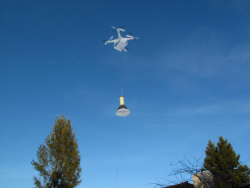n6gn
About
- Username
- n6gn
- Joined
- Visits
- 4,511
- Last Active
- Roles
- Member
- Points
- 18
-
Seeed Metal case and GPIO connector
-
Anyone using the DX Engineering RF-PRO-1B Active Mag Loop Antenna?
The splash image on http://n6gn.no-ip.org:8073/ has a schematic of a MW band stop that surpresses MW BCB by about 20 dB and allows for one additional notch elsewhere. This may protect a Kiwi from OV while still allowing only slightly reduced access to stations in MW and good access elsewhere. It can be fabricated from inexpensive SMD components. -
Possible to pass arguments to an extension using kiwirecorder?
While " /sys/class/gpio/gpioNN/value" did allow toggling the lines, it seems that it is toggling more than one. I haven't studied the class to understand it and there may be a way around this, however, Gwyn G3ZIL, kindly pointed me to another way that seems to do exactly what I want even more directly. It is:
rsh root@[kiwi IP address] "/root/extensions/ant_switch/frontend/ant-switch-frontend N;" 2>/dev/null
where N is the Antenna N selection desired and 2>/dev/null throws away the return text from the BB resulting from the remote shell call. I expect using this method requires compiling the ant_switch extension into the Kiwi but that is well documented and only takes a few minutes.
This seems to work precisely as hoped and allows setting the GPIO lines of the ant_extension one-at-a-time. I measured 600 ms/setting across my local network.
If someone simply wants a few control lines to use to programatically control an external device on a kiwi - whether an antenna switch or something else - this seems to be a quick, easy and effective way to do it remotely.
I've only tested from a remote computer running Ubuntu Linux but perhaps someone more familiar with Windows can provide an equivalent method for that OS.
See https://github.com/OH1KK/KiwiSDR-antenna-switch-extension/blob/master/docs/antenna-schedules-using-crontab.txt
for automating this with crontab from the kiwi itself. -
MIni Enhancement on the new S meter
Darn, file attach didn't work. Here it is in-line:
#!/bin/bash
### This bash script to sweep a kiwi and report S-meter reading
### steps through the set frequencies
### and stores the results, timestamped, in a file whose name is passed as an argument when calling the script
### Dependencies: Needs kiwiclient directory with kiwirecorder.py
### Version 1.0 May 2019 Script from Gwyn Griffiths G3ZIL hacked for WB7ABP by N6GN
### Version 1.1 throw away initial measurement after frequency (or other?) change. It's bogus. Remove delays
#
#if [$# lt 1]
# then
# echo "no argument"
#fi
#
#3echo "This script needs a single argument, the output file name with a csv extension, e.g. test_22_May_2019.csv"
VERBOSITY=1 # set 1 for test mode, otherwise 0
# say where kiwirecorder is on this host
KR='python /home/ge/kr_test/kiwiclient-master/kiwirecorder.py'
# set the start, stop and increments for the test frequencies, could also be an array e.g. for wspr bands, revisit
START=12000
INC=50
STOP=16000
# quiet ? spots
LIST="60 400 560 600 760 1060 1360 2500 5000 10000 15000 20000 25000 28000 29950"
#LIST={$START..$STOP..$INC}
# one frequency point with 2 averages takes about 1 sec, 10 averages ~2 sec and 100 takes ~20 seconds.
AVERAGES=10
# target KiwiSDR
HOST=10.0.0.77
PORT=8074
# write header to the csv file, with names on one line, units on the other
DATE=`date --utc "+%Y/%m/%d %H:%M"`
echo "Measuring, $HOST, $PORT, on, $DATE" >> $1
echo " Frequency, S Meter" >> $1
echo " kHz, dBm " >> $1
#for i in `seq $START $INC $STOP`
for i in $LIST
do
echo "acquire data for $i kHz"
# set to 10kHz bandwidth
OFF=`$KR -s $HOST -p $PORT -f $i m iq -L -5000 -H 5000 --s-meter 1` # discard, first reading is bogus !!!!
OFF=`$KR -s $HOST -p $PORT -f $i m iq -L -5000 -H 5000 --s-meter $AVERAGES`
# strip off the leading "RSSI:"
Smeter=$(awk -F: '$0=$2' <<<"$OFF")
if [ $VERBOSITY == "1" ]; then
echo "Level was $Smeter dBm"
fi
#
# write data to the file
# get the date and time in UTC
# DATE=`date --utc "+%Y/%m/%d %H:%M"`
# echo "$DATE,$i,$Smeter" >> $1
echo "$i,$Smeter" >> $1
done
echo "Finished sweep"
echo $LIST -
MIni Enhancement on the new S meter




